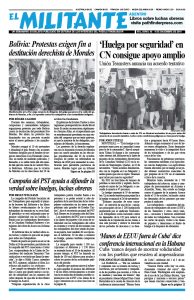CHICAGO — Gerald Reed went back to court here Oct. 25 in another bid to win his freedom. He has been incarcerated on frame-up charges extracted by cop torture for a 1990 double homicide that was overturned last year.
Cook County Circuit Court Judge Thomas Gainer threw out Reed’s conviction last Dec. 19, granting him a new trial. He scheduled a hearing three weeks later to discuss bail, and ruled Reed could not be returned to prison. He was remanded to the Cook County Jail.
More than eight years ago, the Illinois Torture Inquiry and Relief Commission upheld Reed’s claim he had been tortured by Chicago police detectives. The commission had been set up following protests that forced out the truth about widespread torture and frame-ups by Chicago Police Commander John Burge and his notorious Midnight Crew.
The latest chapter in Reed’s ordeal began two days after Gainer’s decision, when Cook County Special Prosecutor Robert Milan announced plans to retry Reed and blocked him from getting bail. Then Gainer stepped down from the bench and the case was assigned to a new judge, Thomas Hennelly.
At the Jan. 9 hearing, Hennelly said he was unfamiliar with the case and postponed arguments until Jan. 30. That hearing was supposed to address the motion for bail and another motion to dismiss the original 1990 indictment filed by Reed’s attorneys, Elliot Zinger and Larry Dreyfus. But the judge declined for months to rule on the motions.
Armanda Shackelford, Reed’s mother and a tireless fighter for his release, has attended every hearing, accompanied each time by dozens of his supporters, including mothers of other Burge torture victims.
They listened in amazement Oct. 25 as Hennelly finally explained the monthslong delay. The judge announced that court clerks had never sent him the full trial transcript, and that Reed’s torture-forced “confession” had not been suppressed. In all Reed has spent nearly 30 years behind prison walls.
The procedural delays and snaillike pace of legal proceedings Reed has had to endure exemplify the situation confronting more than 100 men still in Illinois prisons who have yet to receive hearings on their allegations of torture. The outcome of Reed’s fight has important implications for these remaining imprisoned victims of torture at the hands of Burge and his crew.
Meanwhile, Reed and his supporters plan to step up the fight both inside and outside the courtroom for his release on bail and his exoneration.
Mark Clements was a victim of Chicago police torture and spent 28 years in prison on frame-up charges.

